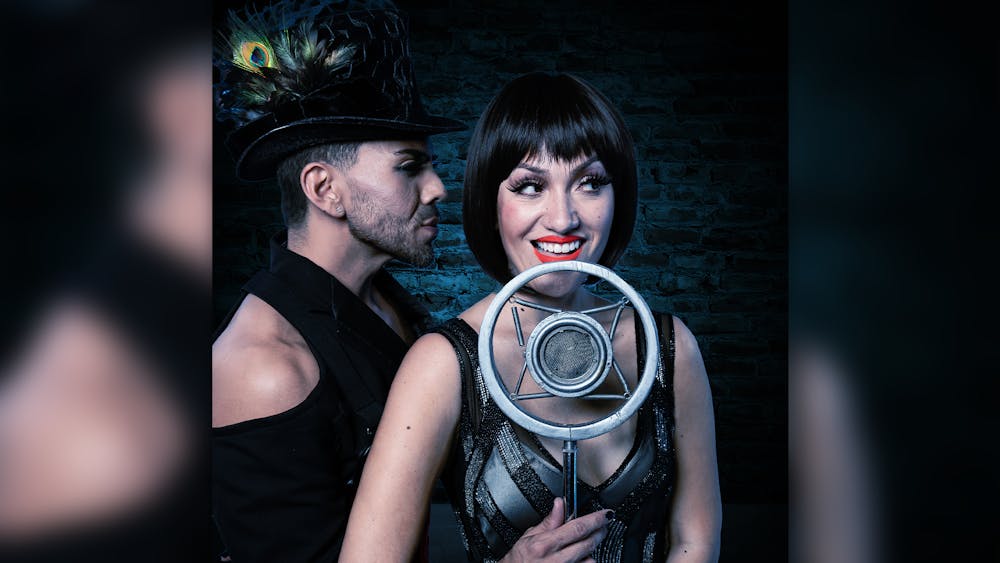After the curtain opened in November 1966 at the Broadhurst Theatre in New York City, “Cabaret” has been reimagined with each new version. Audiences can experience changes in song selection and staging with the 2024 revival at the August Wilson Theatre in New York City, which is also currently running locally at the Phoenix Theatre Company.
“Cabaret” began as "Goodbye to Berlin," a semi-autobiographical novel by Christopher Isherwood that recounts his time in 1930’s pre-Nazi Berlin. The novel was then adapted into a play in 1951, “I Am a Camera,” by John Van Druten, and later transformed into “Cabaret” in 1966 by duo John Kander and Fred Ebb.
Set in 1929-1930, Berlin, Germany, also known as Weimar Germany , the musical focuses on the hedonistic nightlife at the Kit Kat Klub, which is contrasted with , fascism and anti-semitic views that become increasingly apparent with the uprising of the Nazi Party.
Emcee (Eddie Maldondao) helps emulate the spirit of Berlin at the time with “Willkommen” and sings, “Leave your troubles outside!... We have no troubles here! [The Kit Kat Klub] /Here life is beautiful.”
Maldonado helps maintain the spirit of Berlin while adding his own spin to the risqué character.
Clifford Bradshaw (Christopher Behmke), an American writer, arrives in Berlin, and more importantly, at the Kit Kat Klub, looking for inspiration for a new novel. There, he meets Sally Bowles (Alyssa Chiarello), an English woman who works at the Klub, and she opens with a flirtatious number, “Don’t Tell Mama.” Bowles notices Bradshaw’s English/Americain style and invites him over for drinks.
The next day, Bowles rushes into Bradshaw’s boarding house after she is kicked out of the Kit Kat Club. This scene begins their romance while down the hall Fräulein Schneider (Johanna Carlisle-Zepeda), owner of the boarding house, and Herr Schutz (Mike Lawler), a Jewish fruit shop owner, begin their relationship.
Lawler brings much-needed optimism to the storyline, while Carlisle-Zepeda maintains the image of respectability in and around this doomed romance.
Schutz offers Schneider a pineapple in “It Couldn’t Please Me More,” which symbolizes hospitality in their relationship and leads to a proposal. However, in “What Would You Do?” Carlisle-Zepeda sings, “But Imagine if you were me/ Alone like me/And this is the only world I know,” and realizes that if she were to marry Schutz she would risk losing everything she knows because Schutz is Jewish.
Sally Bowles becomes pregnant, and with growing tensions within the city of Berlin, Clifford Bradshaw urges Bowles to flee the country and move to America with him and his family.
Bowles goes back to the Kit Kat Klub, debating if she would be a good mother and stay faithful to Cliff while she sings her ode and acceptance to the show: “What good is sitting alone in your room?/ Come hear the music play/ Life is a Cabaret, old chum, Come to the Cabaret." She chooses, in the end, to get an abortion, embedding herself within the Klub.
Chiarello's performance in this song evokes a sense of hopelessness in the audience, as her character embodies those who remain oblivious to the changing world around them, a theme reflective of many individuals in Germany during that era.
By the show's conclusion, time has caught up with everyone at the Klub. The Emcee dramatically unzips his clothes, revealing a striped uniform similar to one worn in concentration camps.
Tickets for “Cabaret” at the Phoenix Theater Company will be available through September 1st on their website, here.

